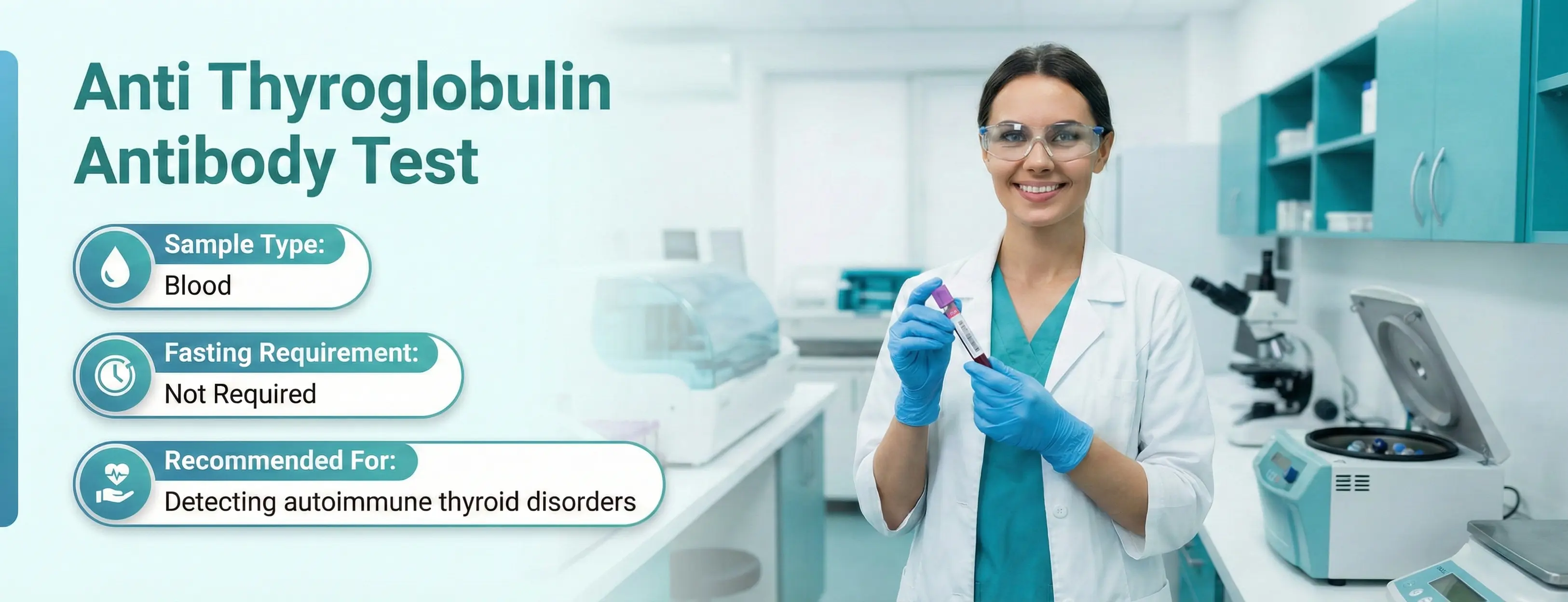120+ orders placed in your location
100% NABL & ISO Certified Lab • 100% Accurate Reports
Anti Thyroglobulin Antibody Test
TG (Thyroglobulin) antibody test, Thyroid antibody test, Anti TG antibody.
- SummaryThe Anti-Thyroglobulin Antibody test detects antibodies against thyroglobulin, a protein produced by the thyroid gland. It helps diagnose autoimmune thyroid disorders such as Hashimoto’s thyroiditis and Graves’ disease, and monitor thyroid cancer treatment. The test is done using a blood sample, and fasting is not required.Read more
- Reports Within16 HrsView Sample Report100% NABL & ISO Certified Labs
- SampleBlood
- AgeAll Age Group
- GenderMale and Female
- FastingNot Required
PharmEasy Promises
Know More About The Test
A quick info on Anti Thyroglobulin Antibody Test
Overview
The thyroid gland is essentially a small butterfly-shaped gland located in the front of the neck. It performs a variety of important functions. The functions include producing hormones that regulate metabolism and help in the growth and development of the body.
Thyroglobulin is a protein produced by the thyroid gland that helps in the production of the thyroid hormones, namely thyroxine (T4) and triiodothyronine (T3).
The immune system is a collection of glands, cells and organs that work together to protect the human body from foreign bodies. This system includes white blood cells and lymph nodes, as well as the tonsils, spleen, bone marrow, gastrointestinal tract and skin. Foreign bodies such as bacteria, viruses, chemicals, parasites, etc., are the most common threats to the human immune system.
Antibodies are essentially proteins produced by the body’s immune system that bind to proteins present in any foreign matter. Many parts of the body, including the thyroid, can be affected by autoimmune disorders. When the immune system attacks the proteins in the body cells, even though they are neither harmful nor foreign, an autoimmune condition results.
When the immune system detects a foreign protein in thyroglobulin proteins, it produces antibodies to combat the threat. An Anti Thyroglobulin Antibody Test is necessary to check for an autoimmune thyroid disorder or if a doctor suspects a thyroid problem.
Sample Type
To check for thyroglobulin antibodies, a blood sample is required. The presence of a large number of antibodies in blood denotes that the thyroid is not functioning properly.
Risk Assessment
Hashimoto’s thyroiditis, Graves’ disease, Postpartum thyroiditis, Neonatal hypothyroidism
What does this test detect?
A thyroglobulin antibodies test is used to diagnose thyroid-related autoimmune diseases. It aids in the diagnosis of Hashimoto disease, postpartum thyroiditis, neonatal hypothyroidism and Graves' disease, which are autoimmune thyroid diseases.
This test is usually recommended for adults who have symptoms of hyperthyroidism (overactive thyroid) or an enlarged thyroid gland and your doctor feels you may have a thyroid problem such as Graves’ disease or thyroiditis. The Anti Thyroglobulin Antibody Test determines the antibodies to thyroglobulin produced in the body.
This test may be recommended for children if they have symptoms of a thyroid problem, such as thyroiditis (thyroid inflammation) or a goitre (an enlarged thyroid) or if blood tests for T3, T4 or thyroid-stimulating hormone (TSH) revealed abnormalities.
Indications for Anti Thyroglobulin Antibody Test
Before surgery to remove the thyroid gland for cancer, a thyroglobulin test may be prescribed. It is also recommended after therapy to see if any normal or cancerous thyroid tissue may have been left behind. After surgery, this test is frequently required on a monthly basis to ensure that cancer has not returned or spread.
If you experience symptoms of a thyroid issue, such as exhaustion, unexplained weight gain, constipation or dry skin, your doctor may request an antithyroglobulin test.
Test Preparation
Before the Test
Prior to undergoing the Anti Thyroglobulin Antibody Test, it is essential to fast for A to B hours beforehand. This fasting period is crucial in order to obtain accurate test results. Therefore, it is advisable to consult a physician before taking any test to know if there are any specific restrictions to be followed.
During the Test
A phlebotomist will draw blood from a vein in your arm for the sample. Your experience will likely involve:
- Disinfecting the site where the needle will be inserted with an antiseptic.
- Wrapping a tourniquet around your arm to make the veins more visible.
- Inserting a disposable needle into the vein to collect the blood. This process may cause minor discomfort from the needle and could take a few seconds.
- Placing the sample in a small container or test tube labelled with your test information.
After the Test
Once the Blood Sample is Collected:
- Applying a bandage to the site where the needle was inserted to prevent any bleeding.
- You may feel slightly sore or lightheaded, which is normal and nothing to be concerned about. You may be advised to rest for a few minutes.
- Contact your doctor if you experience any bleeding, discomfort, or rashes at the puncture site.
Parameters
One should get an Anti Thyroglobulin Antibody Test under the following conditions:
- Experiencing hyperthyroidism symptoms, including sweating, high heart rate, tremors, anxiety, weight loss or bulging eyes.
- Experiencing hypothyroidism symptoms, including weight gain, fatigue, constipation or cold intolerance.
- To determine the effectiveness of thyroid cancer treatment before and after it is completed.
- To keep track of thyroid cancer recurrence.
- There is a higher risk of thyroid dysfunction or other autoimmune diseases.
Antithyroglobulin antibodies may indicate the presence of conditions such as Lupus, Grave's disease or Hashimoto’s thyroiditis, often known as Hashimoto's disease. One could also have Type 1 diabetes, thyroiditis, thyroid cancer or thyroid nodules if she/he experiences these symptoms.
The following symptoms may occur due to a thyroid problem:
- Nervousness or anxiety
- Inability to sleep
- Persistent fatigue
- Heat or cold sensitivity
- Inability to concentrate
- Gaining or losing weight
- Tremors or muscle weakness
- Dryness of hair
- Hoarseness of voice
- Vision issues, such as irritated eyes
- Heavy, frequent menstrual periods
Ranges
To check for thyroglobulin antibodies, a blood sample is required. The presence of a large number of antibodies in blood denotes that the thyroid is not functioning properly.
The antibody test levels should be in the range of <60.00 IU/mL.
The normal values and reference ranges of the test may vary from lab to lab. Please refer to the ranges mentioned in the report and consult a doctor to understand the interpretation of lab reports.
Test Result Interpretation
This blood test looks for the presence of antibodies produced in response to thyroglobulin by a body.
- Tg levels less than 0.1 ng/mL must be interpreted in combination with TSH levels, repeated Tg readings and radioiodine ablation status. A value of less than 0.1 ng/mL in athyreotic patients indicates a low probability of clinically detectable papillary/follicular thyroid cancer (1-2%).
- Tg levels ranging from 0.1 to 2.0 ng/mL indicate a low risk of recurrent papillary/follicular thyroid cancer that is clinically identifiable.
- Tg values ranging from 2.1 to 9.9 ng/mL in patients on suppressive medication indicate a higher risk of recurrent papillary/follicular thyroid cancer.
- Tg values less than 10 ng/mL in patients on suppressive medication indicate a high probability of clinically detectable recurrent papillary/follicular thyroid cancer (>25%).
Anti Thyroglobulin antibodies are identified in your blood if you get a positive test. They may be present with the following conditions:
- Graves’ disease or an overactive thyroid
- Hashimoto thyroiditis
- Subacute thyroiditis
- Underactive thyroid
- Systemic lupus erythematosus
- Type 1 diabetes
Antibodies for these proteins can be seen in pregnant women and the family members of people with autoimmune thyroiditis. It may be more difficult to assess thyroglobulin level if one has a positive test for antithyroglobulin antibodies. Thyroglobulin levels are a crucial blood test for determining the possibility of thyroid cancer recurrence.
Risks and Limitations
The Anti Thyroglobulin Antibody Test is a standard blood test that is generally safe and does not commonly result in complications. However, kindly contact your physician immediately if you encounter:
- Persistent bleeding from the needle insertion site.
- Pain or swelling at the site of blood collection.
Limitations of the test
- Possibility of errors caused by equipment or human factors.
- Risk of misinterpretation of the test markers.
Was This Test Information Helpful?
Please rate your experience
References
People Also Ask
Does thyroglobulin antibody mean cancer?
When should thyroglobulin antibodies be checked?
What is a normal thyroglobulin antibody level?
What is the thyroglobulin antibody test for?
What causes high thyroglobulin levels?
Have any doubts? Ask us.
Ask us anything about the Anti Thyroglobulin Antibody Test to understand it better
Explore More at PharmEasy
Top-Selling Healthcare Products
We provide trusted, expert-curated health content to support better awareness,prevention, and care.
Backed by experienced doctors, medical experts, and strict editorial standards.


